I saw a question on Reddit the other day asking what the Sopranos was really about. The most common answer was that it’s a show about a mob figure (you think?). Other people who like to appear as deep thinkers said it’s about the family life of Tony Soprano and that it’s hardly about the crime life at all. The easiest and most accurate explanation would be that the shows about the dual ‘family’ life of Tony Soprano’s personal life and Soprano crime family life, hence the all-encompassing name of the show, The Sopranos.
However, that’s not really answering the question. All the drama, the crime, the social commentary, what did it all mean? What was the moral of the show? I think the dozens of different plot points and situations each call for their own individual interpretations that don’t necessarily point to an overarching theme of the show. So, for many people, the moral can be diluted or hypocritical, or all over the place not really making much sense. That scrambled meaning was intentionally done.
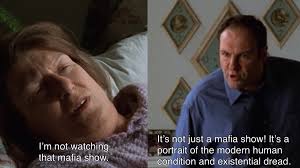
What The Sopranos is really about is living as an imperfect person in an imperfect world. Knowing you should do better but not being able to change it. Even that explanation doesn’t fully cover every aspect of the show, but I think it’s the most potent one. Whether it’s the regret of being trapped in a never-ending life of crime, or the inevitable corrosive effect that your internal battles will have on others, nobody can escape the dangers of themselves. Let me give some examples of how individuals can’t escape themselves and why the mob is the perfect situation to show this concept thematically.
Uncle Junior loves his nephew Tony Soprano except that his ego won’t allow him to love him unconditionally. Tony needs to constantly earn his uncle’s love. For every moment of solace between them, there is an equal amount of disdain. When he talks about why he never married, Junior explains that he couldn’t bring a woman into his life of crime, as if to spare her of the cruelty. He’s never been able to love someone unconditionally, and in the end, he ruins his reputation and family connections anyway. Meaning that what he sacrificed for was all in vain regardless of the caution he took to avoid such outcomes. He still harmed women, he harmed his family, and was himself, an embarrassment in the end.
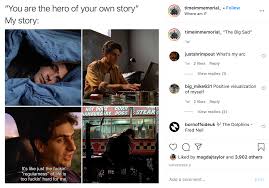
Christopher Moltisanti is another one. He gives his life to his boss Tony Soprano because of the idea that he’ll be a gangster idol like Tony Montana. With every situation that passes, he realizes that he’s not cut out for the life and every time he has a chance to leave it all behind, he takes up the easy path and continues down the life of crime. To cope with his poor decisions, he turns to a life of drugs, which ultimately diminishes any chance he has of appearing as a respectable gangster and in the end, dies in the opposite manner of Tony Montana.
Tony Soprano is my final example, but it’d be hard to locate any characters that had a traditional “arc” in this show. Tony was the boss of the Sopranos family and was previously the perfect representative of that life. He had respect, he had friends, he had family. The more power he received, however, the more of his character that was put to the test. Everything that he gained in that life up to this point was due to him not seeing the ramifications of his actions and being able to hide his feelings and decisions from those around him. As soon as he was unable to hide who he was, he lost everything that he built. Each character is a lot more complicated and can’t be summarized in just one paragraph, but I think you can see my point.
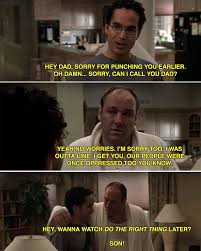
The mafia is the perfect way to represent the hypocritical nature of people and demonstrates how flawed we all are. In the mob, your status is built upon respect, manhood, and power. Each of these traits are shown to be true in most characters, and likewise, that they are capable of the opposite. These men snitch on each other, break their holy rules, and gossip behind each other’s backs. They demonstrate fear consistently, whether its fear of being demoted, killed, or not being viewed the way they want to. The mafia life glamorizes cars, houses, and women, yet most are married to aging, unattractive women, and are constantly afraid of losing their assets. They honor loyalty when they each cheat on their wives. They value the rules, yet they constantly break them. They value authority just as each member works to undermine the other. They value religion when they constantly live in sin. This thing that they dedicate their lives too, with death as the punishment for not complying, is still subject to their individual flaws and interpretations.

The mafia’s entertaining hypocritical nature is blended with the more realistic personal lives of the people around them. Just as the mafia snitches on another, the housewives gossip on each other’s personal issues. They indulge in their personal vices such as shopping, eating, and cooking. The women pretend to like each other and compete for each others affection when they each couldn’t care less about the other. All their relationships are built upon lies that they tell each other over and over. Which is akin to how delusion works in the real world.
There’s a slim line between hope and delusion and just as hope can power you through something, so can delusion. It’s often times that characters in this show and in real life misconstrue hope and delusion. The men are delusional and hopeful over successful careers and the wives do the same for their personal lives. Each is fully aware that the ending is not going to be what they think, but the present is too comfortable to change the inevitable demise.
Children in the Sopranos are used as canvases for the parents to live through. The parents reject most of what the child says and does, to pretend that they are something completely different. They’re used more as status symbols than they are as living breathing people with their own interests. They must follow along with what the parents want or else it would hurt the delusions of the parents. Children are talked about as untouchable jewels among the families, except when we see that a mob-father is disgraced, the lives of his kids are also forgotten about. They only have value when they add to the delusion.
In the end therapy, friendship, love, marriage, religion, and basically anything that can change a person’s life for the better, was shown to have the opposite affect. Most of the positive changes came from a delusion that the character had that they were leading towards something better. When they could hide themselves from the reality of who they are. I think that says a lot about the human psyche. That people don’t really change, they change what they reveal to the world.
In the world of The Sopranos, where everyone is together for constant dinners, meetings, and family gatherings, they live in a constant cycle of delusional roleplaying. The second that real issues come up or the veil is pulled back, they reveal that they aren’t who they’ve pretended to be and are then reprimanded. Instead of accepting the consequences of their past transgressions and moving forward, they are forced back into the delusion.

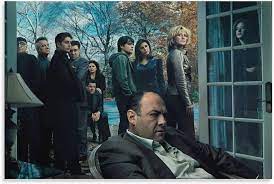


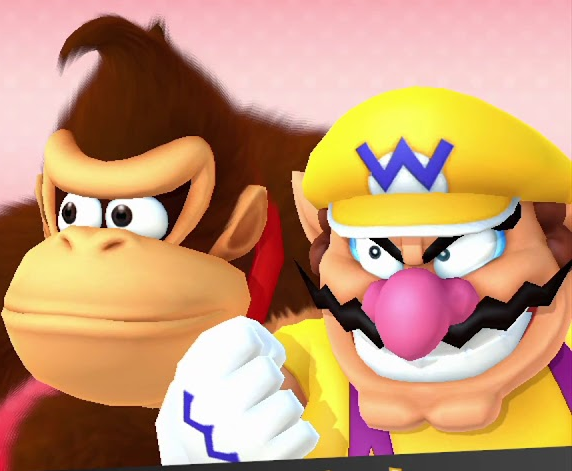

Leave a comment